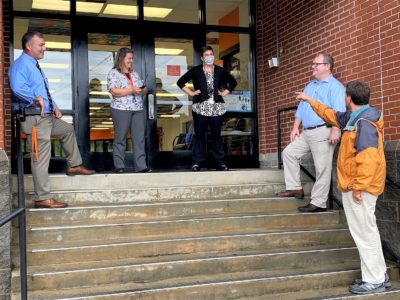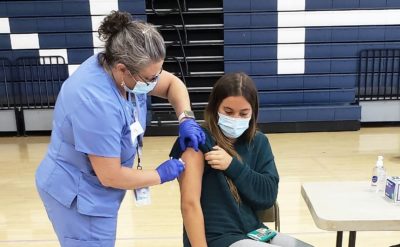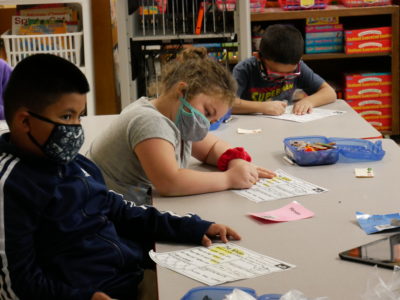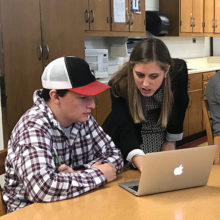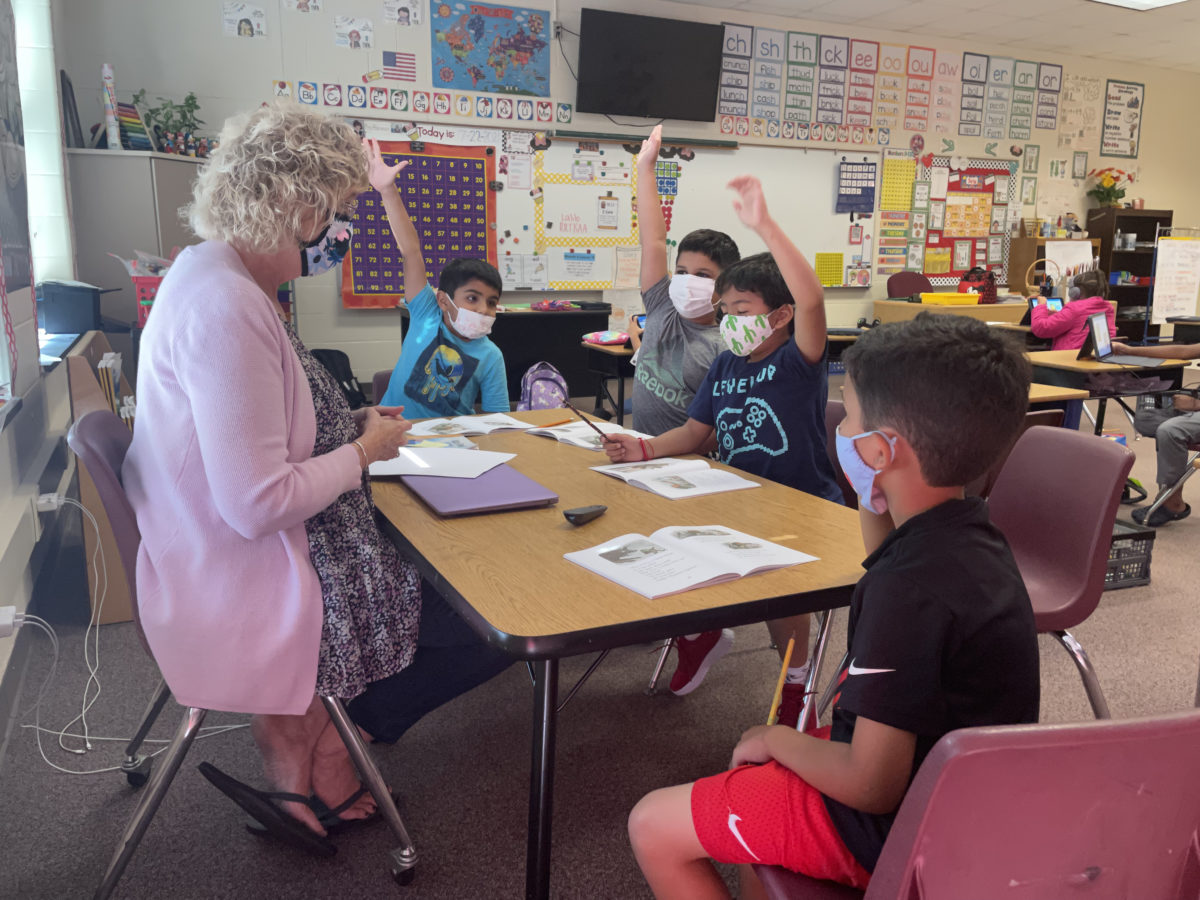
|
|
Students across North Carolina are going back to school this week to start a third year of learning impacted by the COVID-19 pandemic. And while many hoped this school year would be easier than the last, the delta variant is putting that to the test.
Already, schools and districts that have opened early have had to quarantine students and staff due to positive COVID-19 cases. Local school board meetings have turned contentious over the decision of whether or not to require masks in schools. In the meantime, teachers are preparing to have kids in classrooms again, and many are learning a new way to teach reading.
In the midst of all this, EdNC surveyed our readers and asked what they want to know about education in North Carolina this year. From July 16 to July 29, EdNC.org conducted an online survey of our readers. Overall, 554 readers responded, leaving 1,030 comments.
We asked survey participants what stories, topics, and issues they want us to cover. We also asked what questions they have about education. Responses ranged from teacher pay to testing to the impacts of COVID-19 and beyond. The following are the major themes along with select comments from the survey.
Sign up for the EdDaily to start each weekday with the top education news.
Keeping students and staff safe this school year
Several respondents expressed concern about student safety and the delta variant of COVID-19. Others wanted to know what schools are doing to keep students and staff safe, including requiring masks, contact tracing, and quarantining.
EdNC published this overview of the state Department of Health and Human Services StrongSchoolsNC Public Health Toolkit that includes guidance for schools on promoting vaccination, masking, physical distancing, and more.
“Various COVID responses by the school districts, including masking, vaxing, virtual, illness, and how students and teachers are responding.”
“Schools being well equipped to protect teachers and students against the virus.”
“Issues depicting how educators feel about their safety in the schools with students who are not eligible for vaccination. How they will ensure their safety?”
“The new strand of Covid-19 and safety protocols going into this school year.”
How the pandemic has impacted students and what schools are doing to address it
EdNC readers want us to cover how the pandemic has impacted students’ learning and mental health and what districts are doing to address that.
“How are students really handling returning to the classroom? Emotionally and academically . . . Is there as much ‘learning loss’ as many feared?”
“The performance levels of students — where they are now and where they should be. How far behind are we really?”
“How are students recovering from last year: academically, socially, and emotionally? What data is being used to support losses (inevitable last year for perhaps most students)? What practices do we have in place to support student growth again? In short, what lessons can educators learn from pandemic teaching and learning to strengthen educational systems?”
However, some respondents pushed back against the assumption of learning loss due to the pandemic.
“How can we change the narrative about ‘learning loss’ and thus being a ‘catch up’ year?”
Respondents also want us to cover both student and educator mental health in light of the pandemic.
“Social & Emotional issues of TEACHERS. We are humans and we turned education around, but at what emotional and mental cost? Also, if the state wants us to tend to the social & emotional well-being of students and our curriculum course of study, please give consideration to balancing these things. Providing attention to students’ well-being and needs for educational gains (due to Covid learning-loss) will mean sometimes the course of study might not be center stage for all students.”
Teacher pay, recruitment, and retention
Several respondents said they want us to cover various aspects of teacher recruitment and retention, including teacher pay. Some highlighted the fact that veteran teachers have not received pay raises for several years.
The North Carolina House budget proposal expands the salary schedule for teachers who have been in the profession for more than 15 years so that teachers would get a salary increase each year until after year 25. The Senate proposal has years 15-24 in one step.
“NC teachers deserve a raise. Teachers worked throughout the pandemic and have not been compensated. Everything has increased, ex. gas and food. The housing market has improved and increased, but teachers have not gotten a raise. Every profession comes through teachers, yet they are some of the lowest professionals to be paid. If we want to attract more educators, why not pay them well.”
“I would like for you to cover a major issue that keeps getting pushed to the back burner. The issue is teacher pay. We have had to take on more and more roles and responsibilities and continue to get no increase in compensation. I am a veteran teacher and will not get a raise for the rest of my career, which is 10 more years. What other occupation does that? As a single adult, I have had to work a second job for 14 years now. Please help make a difference and get us an annual raise like a normal job. We do too much to be valued so little. There are many jobs that start at or near $50,000, and I’m making that after teaching for 19 years.”
“Honestly one of the other biggest issues is just how unsustainable teaching is for so many educators, and how many educators are leaving the field because of that, and what the outlook for public education is in this state and in the country because of these issues.”
The legislature, CRT, and Leandro
Survey respondents want to know what is going on at the legislature that relates to education, including the budget and any legislation on Critical Race Theory.
“Why hasn’t a budget been passed in two years? How can the state representatives justify NOT having a budget for this year and don’t appear to have a sense of urgency to pass one? There is more than teacher pay in the budget that should be decided.”
“How will the legislature’s mandates affect public education, esp. regarding [Critical Race Theory], LGBTQ+ students, and/or pandemic precautions/recovery?“
“The state’s plan on addressing how and why CRT is or is not going to be incorporated into the curriculum.”
“How do I talk about race and inequality without being accused of teaching critical race theory?”
Respondents also want to know what is happening in the long-running Leandro case.
“Progress and updates about Leandro and how that’s been implemented.”
“How will Leandro be enforced?”
Testing and student assessment, especially in light of COVID-19
Respondents want to know how the state will assess student learning with respect to the pandemic. Several respondents also asked how the data from end-of-grade (EOG) tests will be used to evaluate teachers and schools this year.
“How will the data from EOG be used since we were in a pandemic and it was a challenging year?”
“Whether assessment data — and which data — is being used to impact instruction and how. Which assessments have been most useful in understanding student needs relative to unfinished learning due to COVID and how are districts, schools, and teachers using that information to inform instruction.”
“How do we adequately measure school progress after COVID? What happens to schools that have been stuck in a federal status (CSI/TSI) that were supposed to come out of status after 3 years? Since there is no longer going to be an ISD, what happens to chronically low performing schools in NC?”
“I’d also like to know why North Carolina continues to give state tests to 3rd, 4th, and 5th graders as often as they do. For example, last year we had mClass, passport, 3 check-ins, and 2 EOGs in our grade level. We were told that testing would be less, but all that appeared to be done was reduce the number of questions on the tests by a few.”
Curriculum and the new social studies standards
The State Board of Education approved new social studies standards in February. Several survey respondents asked questions about curriculum and standards in North Carolina. Respondents wanted to be kept up-to-date on the new social studies standards and wanted to understand how districts select curriculum.
“How do I give input on the standards and assessments that are selected for NC?”
“Please continue keeping us up to date on curriculum changes like the new standards for Social Studies and how it relates to covering burning topics from American history.”
“I wish I knew more about how different [local education agencies], when given the choice or power over curriculum, came to those decisions, along with how they determine what is best for their students, based on particular demographics.”
Literacy
In April, the legislature passed and Gov. Roy Cooper signed a bill mandating that literacy instruction be based on a body of research called the science of reading. This year, pre-K through fifth grade teachers will receive training in the science of reading through the Language Essentials for Teachers of Reading and Spelling (LETRS) training program.
Survey participants had many questions about literacy, including why the state’s previous literacy legislation, Read to Achieve, did not produce gains. They also wanted to know how teachers will implement the science of reading in their classrooms.
“Why has early literacy – and specifically 3rd grade reading – not improved substantially under the Read to Achieve legislation? What are the flaws or gaps in that legislation that have prevented significant progress in early reading (as seen in other states with similar legislation and policy)?”
“Incorporating Science of Reading into our reading instruction if we are using a district provided curriculum.”
“Science of reading professional development and student gains related to explicit and systematic reading instruction.”
Other
Survey respondents identified a variety of other issues they want EdNC to cover and questions they have about education. Some of those include:
- How schools are funded;
- What powers school boards have and why they are elected;
- How vouchers for private schools work;
- Innovative practices;
- Broadband accessibility and affordability;
- The state of school facilities and costs to repair;
- Racial equity and equity in special education; and
- The impact of the pandemic on arts education.
Do you have other story ideas, issues, or topics that you want us to cover this year? Do you have questions about education in North Carolina? Let us know by filling out the survey below.
Recommended reading
